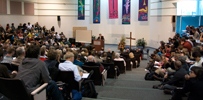Racism and Christian Witness

On the National Day of Action Against Anti-Asian Racism, Dr. Mark Glanville reflects on a scriptural response to the realities of racism in Vancouver and beyond.
Read Regent's Statement on Racism and Anti-Asian Violence here.
The horrific murder of six Asian women, a white woman, and a white man in Atlanta in March of this year has shocked many of us, raising awareness of anti-Asian racism. The event has precipitated rising awareness of anti-Asian racism and hate crimes in America and in Vancouver.
This has hit close to home for the Regent community in the form of further violence. A Korean woman, who is student at UBC, was physically assaulted less than 100 meters from Regent College three weeks ago. At the time of the assault she was working at H-Mart, a Korean food market on University Blvd.
While growing anti-Asian racism already has been impacting our sisters and brothers at Regent, the physical assault at H-Mart produced a new level of vulnerability for our community. A mother, for example, no longer feels safe to walk in the neighbourhood with her young child. Others are extra vigilant when they go shopping or take the walk to Regent. We grieve as a community. We are in solidarity with one another. We need to listen to those who experience the evil of racism and cry out to God for an end to it.
Some of us likely have made the mistake of assuming that such abhorrently violent racism only happens elsewhere. And yet it is literally next door. Still it would be a mistake of a different kind only to focus on the overtly racist acts. Without a doubt, we rightly deplore the grotesque racism of alt-right protests and the physical abuse at H-Mart. Yet we should consider whether racism runs deeper than this. We should inquire: How does racism operate at the level of societal norms and cultural meaning?
How we understand sin, theologically, is relevant. If scripture describes sin solely as the corruption of individuals, then there may be room to conclude that racism is only expressed by radicalized individuals. Yet what if the problem of evil encompasses the whole creation distorted by sin, a good world that is yet enthralled to evil (Matt 4:8–9)? What if the problem includes the devil and a host of evil forces (Eph 6:12)? What if it includes humanity following the “course of this world” (Eph 2:2), and if evil is also embedded in legal systems (Is 10:1–2)? The biblical story insists that the problem of evil is as wide as creation, a cosmic evil that animates an intricate network of cultural systems. Does this not include racism?
While some of us default to an overly individualistic conception of racism, even despite our best intentions, Black scholar Drew Hart (who recently appeared in a Regent webinar) points to a “definition of racism that comes from the sociology department.”[1] Sociologists ask deeper, structural questions of a society, Hart explains. They ask, what is the meaning of race in culture? How is society structured racially, and what are the origins of these structures?[2] Racism is “a racialized systemic and structural system that organizes our society,” Hart writes.[3]
In one of my Regent classes this year, students shared personal experiences of a subtle and relentless racism running through our society. BIPOC (Black, Indigenous, people of colour) students were invited to share their experiences of race and racism and to offer a theological and practical vision for the church. A female student who immigrated from Korea to Canada with her family in grade three experienced feeling inferior in Canada throughout her childhood and teenage years. “You intuitively know when someone is giving you that racist sentiment, feeling, or comment,” she said. A male student from a Chinese minority culture in Malaysia also shared. While in Malaysia he has experienced racial discrimination, in Canada he feels physically unsafe. In Malaysia he could be attacked for money; here he could be attacked because of race, he explained.
White folks in Canada tend to define racism in individualistic terms, focusing on intentionally racist speech and outrageous violent acts. Yet when calling out explicitly racist behaviour (as we should), we can still ignore the racist water that we ourselves are swimming in. Our outcry against explicitly racist statements, policies, and violence might blind us to our own complicity in racialized systems of which we are a part—as difficult as it may be for us white folk to see.
I am among those white majority Christians who can only learn about a racialized experience from others, and I am slow to see it without help. Listening helps a lot. Reading Daniel Coleman’s book, White Civility, has helped me to listen better. Coleman explores how Canadian literature over the past 200 years has nourished cultural images of white male figures as an ideal representation of being Canadian—identifying four significant white male cultural images. Coleman shows that our concept of “Canadian” isn’t “natural” as we assume (“it’s the way things are”) but is socially constructed. This helps to explain how minority cultures can sometimes be sidelined and ignored in conceptions of national identity, despite the multicultural reality we all live within every day. It also gives us insight into the malleability of national identity. Benedict Anderson explains that national identity isn’t an unchangeable given; rather nations are “imagined communities.”[4] The insight that national identity is socially constructed, “imagined,” opens possibility for fresh creativity around national identity, opening a crack in the closed door of racism as a hopeful possibility for Christian witness.
Indeed, scripture displays a pressing need for Christian witness around race and racism. The origin stories in the book of Genesis, for example, underline the inherent created value of every people group and of every person. All of humanity bears the image of God, is blessed, and charged with the task of image bearing (Gen 1:27–28). Or consider the genealogies. A most unusual aspect of Genesis’ genealogies, among other ancient genealogies, is that they encompass the nations of the whole world. Following the flood narrative, the whole world is depicted as descending from Noah (Gen 10). In this way, Genesis portrays an essential familial unity among humankind. In describing the various people groupings, there is no reference to skin colour or other divergences, rather, the common descent of humanity is emphasized. This universal emphasis highlights God’s ongoing care for every nation, locating Israel as a people whom God chose for a particular calling within a larger community of nations.
For three centuries now, Black American preachers, activists, and scholars have powerfully articulated the theological significance of our common descent. For example, reflecting on Paul’s exhortation that supplications be made for every person (2 Tim 2:1), Black pastor and scholar Daniel Payne (1811–1893) declared:
“[Paul would have us pray] for men in general, embracing the whole family of Adam, in all their varieties as nations, tribes, communities, peoples. This is God-like, because the Eternal loves all, and manifests the infinity of his nature, by his universal care for all mankind. In this, He also demonstrates his universal Fatherhood, and thereby establishes the brotherhood of man [sic].”[5]
In contexts of enslavement and Jim Crow, Christian Black thinkers were convinced that humanity is one family, sharing a Father (Acts 17:26), and that therefore people groups equally possess dignity before God.
This is not the place to discuss other books from the Old Testament where the dignity and value of every people group comes to the fore, including the books of Deuteronomy, Ruth, Job, Jonah, and even Joshua.[6] Or to consider the blessing of a diversity of nations projected in Isaiah’s critique of empire, the universal impetus in the synoptic gospels, Pauline anthropology, or even of the Apostle Paul’s theological vision of the unity of Jew and Gentile—this all must wait for another time. Suffice it to say that on the basis of the sweep of the biblical story, nineteenth-century Black American preachers and activists concluded that the dignity and unity of all of humanity was so fundamental to the story of redemption that these sacred truths will be revealed in power on judgement day. God’s intentions for humanity will be established and displayed upon Christ’s final return, they argued. In this way, as Frederick L. Ware rightly reflects, “Eschatology is a vision not only of a certain end but also of a people’s true humanity.”[7]
How does this all fit within the biblical story and within the gospel? The biblical story narrates God’s triumph over evil (Col 2:15), which is nothing less than a recovery of the divine purposes for the creation, revealed at the beginning of the story. In the Old Testament, God calls and nourishes a people to live as a sign of Yahweh’s restoring reign. And the gospel is the declaration that God is, at last, bringing this story to fulfilment in Christ (Rom 1:1-2; 1 Cor 15:1–5; 2 Tim 2:8). So, the gospel also takes right relations between diverse people groups within its scope (Gal 3:24–29). “The true gospel, which is anti-slavery and antisin, is also antidivision,” Lisa Marie Bowens writes, here summarizing nineteenth-century Black anti-slavery activist James Pennington.[8] (Lisa Marie Bowens also featured in a recent Regent webinar.)
And yet too often white evangelicals (I am one of them) have not only been slow to address racism, but have also, in all too many cases, been among the worst offenders. Historical racism requires our repentance. In their book, One Faith: The Evangelical Consensus, J. I. Packer and Thomas C. Oden address the need for repentance in a section titled “Racial Justice.” They cite what is known as the Berlin Statement (1966) as widely representative of the evangelical consensus, which draws us into confession: “We ask forgiveness for our past sins in refusing to recognize the clear command of God to love our fellowmen with a love that transcends every human barrier and prejudice.”[9] Packer and Oden underline our responsibility as evangelicals to speak with “sufficient clarity and force” in challenging racism, citing this same statement.[10]
To speak forcefully is vital, and yet in order to gain authenticity and plausibility in our speech the church must increasingly embody the unity and love of the Kingdom of God. An encouraging sign of the work of the Spirit in Canada and the US are the many dialogues on racism in local churches, often across political divides. These conversations are rarely easy, and non-white participants often do heavy emotional labour in engaging these important conversations. There are other strategies, too. In the Regent class I mentioned above, a student noted the value of sharing cultural food with one another, nourishing mutual understanding and respect. Another student emphasized the value for multi-ethnic churches to maintain diverse cultural distinctives in worship and in community life, not funnelling diverse and cherished traditions all into one style. Other strategies might be representing a variety of languages in worship and having cultural diversity represented on church staff teams.
I wonder how we can live into this biblical call at Regent more deeply. Packer and Oden’s articulation of the evangelical consensus around racial justice reflects an urgency to train lay leaders and pastoral leaders who are ready to nourish communities to embody the healing reign of God in contexts of cultural racism. What would it look like for white folk at Regent to talk less and to listen more, to BIPOC students, staff, and faculty, on this issue and others? I must admit, I don’t find speaking less all that easy, but I want to grow! “Can white folk learn to follow?” Black New Testament scholar Dennis Edwards challenged my class. And can we continue to read the biblical story in all its richness as it intersects anew with pressing cultural issues such as racism?
[1] Drew G. I. Hart, Trouble I’ve Seen: Changing the Way the Church Views Racism (Harrisonburg, VI: Herald, 2016), 50.
[2] Ibid., 50.
[3] Ibid., 51
[4] Benedict Anderson, Imagined Communities: Reflections on the Origin and Spread of Nationalism (London: Verso, 1983).
[5] Cited in Lisa M. Bowens, African American Readings of Paul: Reception, Resistance, and Transformation (Grand Rapids: Eerdmans, 2020), 159.
[6] See Mark R. Glanville and Luke Glanville, Refuge Reimagined: Biblical Kinship in Global Politics (Downers Grove, Il: IVP, 2021), 99–122.
[7] Frederick L. Ware, African American Theology: An Introduction (Louisville: Westminster John Know, 2016), 171. Cited in Bowens, African American Readings of Paul, 151.
[8] Bowens, African American Readings of Paul, 148.
[9] J. I. Packer and Thomas C. Oden, One Faith: The Evangelical Consensus (Downers Grove, Il: IVP, 2004), 152. The Berlin Statement was produced by the World Congress on Evangelism, Berlin, 1966.
[10] Ibid., 151; again citing the Berlin Statement.




